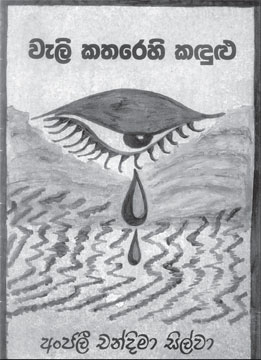Poetry to mull over
Veli Katharehi Kandulu
Author: Anjalie Chandima Silva
An author publication
Reviewed by R.S. Karunaratne
Anyone who reads Anjalie Chandima Silva's Veli Katharehi Kandulu will
sometimes wonder why they should read poetry at all. Reading or writing
poetry in Sinhala or English will not make anyone rich unless they
happen to be in the United Kingdom which exports poetry to other
countries. However, Anjalie is from Sri Lanka, a third world country,
which has produced many eminent poets from time immemorial.
 If you ask Anjalie what poetry is, she will probably say that poetry
is a kind of thing poets write. She is not trying to evade the question
but is urging the questioner into thinking for himself. She knows, like
any other poet, that poetry defies definition. If you ask Anjalie what poetry is, she will probably say that poetry
is a kind of thing poets write. She is not trying to evade the question
but is urging the questioner into thinking for himself. She knows, like
any other poet, that poetry defies definition.
You might define ‘democracy’ or ‘inflation’ but not poetry. Then why
should anyone waste time in writing or reading poetry?
Poets are creative people who write poems for the pleasure of it.
Nobody in his right senses will write poetry to make money or win an
award. Most poets spend long hours to pen a few poems knowing very well
that most publishers are reluctant to publish them. So, most poets
publish their poetry collections as author publications. Anjalie is no
exception.
Students
You cannot blame the publishers for their unwillingness to publish
poetry. They know very well that only a few people read poetry for
pleasure. Students in schools and universities read poetry to pass
examinations. A few of them, however, read poetry with understanding.
They will enjoy reading poetry and benefit from it even after leaving
their seats of learning.
Poetry writing cannot be taught or learned like any other subject
because poets are born and not made. Anjalie falls into the first
category. She gives vent to her pent-up feelings by writing poetry. She
writes her poems spontaneously compelling readers to sit back and think.
The opening poem Athmavabodhaya (Self-realisation) speaks volumes for
her talents as a creative writer.
Self–realisation
Sithuvemi diva re
Pahan sila nivune mandai
Sulangin rakinnata eya
Muva kala vita salupatin
(I thought throughout the day why the oil lamp lost its flame. I
tried to protect it from the wind covering the burning wick with a piece
of cloth.)
Sithuvemi diva re
Mala paravune mandai
Hova gath kala eya
Paputhurehi adarin
(I thought eternally why the flower withered although I embraced it
with love.)
Sithuvemi diva re
Sonduru diya dahara
Sindune mandai
Ehi jalaya surakinna
Vellak bendi pamanin
(I always thought why the stream dried up although a bund was put up
around it.)
Pasak viya mata
Mage varadin
Ma alum kala Siyalu de mata
Ahimivu bava
Sanathanikava
(I realised that I lost everything I loved due to my own faults.)
Pahane somi kekulu nomethiva
Thanivu kala andure
Vetahuni ehi agaya menavin...
Male sonduru bava nodeka
Velapunu kala deneth
Vetahuni ehi agaya boho se ...
Diyadahara mudu sisila
Nodenunukala hadata
Vetahuni ehi agaya dedise...
(When I was alone in the dark I realised the value of the lamp. I
wept as I did not see the beauty of the flower. Then I realised its
value. When I didn't feel the coldness of the water in the stream, I
realised its value.)
Adaraya karanne nam oba
Yamekuta ho yamakata
Eya thibena ayurin
Thibennata heriya yuthu bava
Pasak kota duni mage sitha mata
Kandulu atharin sinasennata...
(If you love someone or something, leave them as they are. Through
this realisation I can smile while shedding tears.)
Intrinsic beauty
Although poetry cannot be translated into another language without
losing some of its intrinsic beauty, the English rendering of Anjalie's
poem will drive home the point that it is futile to own or possess what
you desire. If you try to own or possess people or things, their beauty
will vanish.
Although we have been trained to analyse and appreciate poetry in the
classroom, analysing a poem is like dissecting a hummingbird.
However, poetry is much less perishable than hummingbirds, and
luckily, we can read them at any time, anywhere and decades or centuries
after their publication. A good poem will never vanish from human
memory. This statement is valid for most of the poems written by
Anjalie.
Some of her poems such as Vila saha jala banduna, Asubavadiniyakdo
ma, Dutimi dev ruva and Matahamuvu mithura can be read many times with
interest.
Anjalie is a bilingual poet. Her English anthology of poems Letters
from the Soul like the present collection of Sinhala poems is based on
her experience as a lecturer in English and Sinhala. Her language skills
are evident in all her poems.
At first glance, a poem usually will not make sense and give
pleasure, but it will yield more in time to come. So, Anjalie's Veli
Katharehi Kandulu is not to be galloped over like the daily news. Her
poems have to be read slowly, carefully and attentively.
As regular poetry readers are aware, good poems of this nature yield
more if read twice; and the best poems - after ten, twenty or a hundred
readings - will still go on yielding. |


